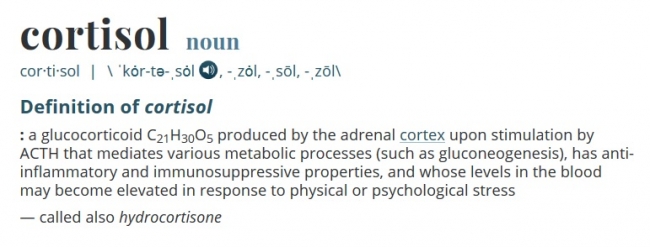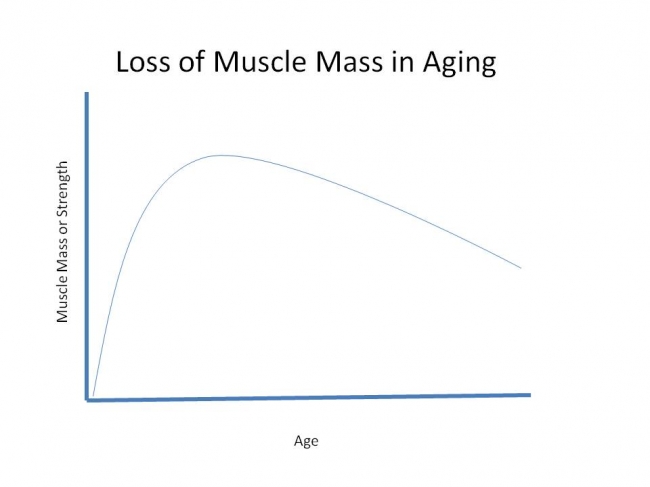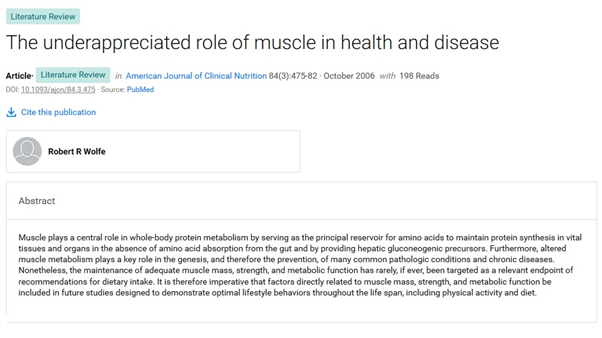Cortisol, Stress and Adrenal Health

by Gavin Deguara, ND, Grad. Cert. Nutr. Med. (RMIT)
Let’s face it, we don’t always feel full of energy and optimism in life. Sometimes, life can be a drag and despite our best efforts at maintaining some semblance of order, forces beyond our control can rear-up and deliver an unwarranted sleight of hand.
We can fantasize all we want about being able to push a few digital buttons on our smart phone to adjust our brain chemistry as needed. Though, arguably, there is a great deal more to the human experience than neurotransmitters and their signals.
Regardless, for now we must adhere to more rudimentary methods. Though these archaic stress-managing, mood-boosting methods may not be as ineffective as you would think, especially given their naturally synergistic biological effects.
There is plenty that can be done to make a massive difference to the way we feel each day. These approaches typically involve dietary changes, healthy exercise habits, creative hobbies, relaxation practices and much more.
The stress hormone balance of human body is malleable. And with a few methods up your sleeve, you can positively impact how you feel in day-to-day life and how you respond during stressful situations.
There’s no doubt about it, hormones have a major impact on the way we feel, react and experience our lives.
Cortisol is one of the so-called stress hormones. And though cortisol and stress go hand-in-hand, this hormone is really important for maintaining optimal health.
We don't want too much.
Nor do we want too little.
When cortisol levels are too high for too long, a range of health issues can follow. Some of these are high blood pressure, impaired immunity, blood sugar problems as well as loss of muscle mass.
Cortisol has also been shown to decrease testosterone levels and promote body fat gain 1,2. This stress hormone can actually increase the storage of fat by telling the body to hold onto its fat stores 3.
Can Cortisol Levels be Tested?
Yes, they certainly can. Urinary, blood or salivary tests can be carried out by your doctor or healthcare practitioner to check your cortisol level.
However, you don’t need to know your cortisol level in order to start de-stressing your life. Many of the strategies in this article will keep your cortisol level in check, whether it’s high or low.
The exception to this rule is if you are extremely unwell or have Addison’s disease. I this case, it is important to seek personalised advice from your healthcare practitioner.
Where is Cortisol Made?
Cortisol is made in the adrenal cortex within the triangle-shaped adrenal glands, which sit on top of the kidneys. Here’s the medical definition of cortisol from the Merriam-Webster dictionary.
To put it simply, glucocorticoid is a term to cover all the different types of cortisol the body makes, which include cortisone and corticosterone. Cortisol makes up 95% of the glucocorticoids.
ACTH is short for adrenocorticotropic hormone. ACTH is produced by an area of the brain called the anterior pituitary. ACTH sends a message to the adrenal glands to produce more cortisol when levels are low.
This system of cortisol control is known as the HPA Axis, or hypothalamic-pituitary-adrenal axis. But there’s no need to remember all this.
Cortisol does a lot more than impact the way we manage stressful situations. We need this hormone to feel alert, active, and perhaps even less stressed and more relaxed 4.
If you’re confused at this point, don't worry! It is a bit of a tricky concept and the real truth behind this hormone does slightly work against the simplistic understanding of "cortisol is bad".
We need a normal, healthy amount of cortisol to feel good—mentally, emotionally and physically. But producing too much for too long is where we run into trouble.
Try this analogy …
Listening to a song for a few minutes can be enjoyable. Though if you listen to that same piece of music for hours, or weeks, it will drive you mad.
The same goes for cortisol. It’s an incredibly important hormone. But we don’t want too much for too long. And too little can be a problem as well.
The Cortisol and Muscle Mass Connection
Muscle mass is very important to optimal health and reducing risk for illness. In fact, the older we are the more important it becomes.
The below graph indicates how muscle mass reduces with age. Peak muscle mass is around the 20-30 years old mark.
It’s easier to build muscle when we are younger, which sets us up for the rest of our lives—as long as we maintain it. And there is a definite connection between muscle mass and bone mineral density too.
In order to create that muscle, stress had to be placed on the muscle and tendons, which ultimately attach to bone. After all, this is how we move limbs and the torso.
Reducing stress and balancing cortisol levels plays a big role in the process of building lean muscle. Too little cortisol and training will be too tiring. Too much cortisol, and our anabolic signals can be blunted, making recovery and adaptation difficult.
Cortisol has a catabolic effect, which means it breaks down muscle protein.
Some people build muscle to change their appearance. Others build it to assist with physical mobility, to prevent falls as we get older, or to help with sports or occupations, such as a police officer, dancer or stunt-person.
Muscle doesn’t just help with movement though, it actually has another important function that few are aware of.
Skeletal Muscle Mass is a reservoir of amino acids, the basic building blocks of protein, much as adipose tissue holds triglycerides. This makes it an important marker of general health.
Muscle protein is made up of amino acids and when that protein is broken down by cortisol, this leads to an increase in blood amino acid levels.
In fact, if you want to dig a little deeper on this subject, I can recommend no better article than the one below. Dr Robert Wolfe is an expert on the subject of essential amino acid nutrition and muscle mass.
The full article is free to download from the American Journal of Clinical Nutrition. It’s technical. But you’re sure to learn something from it even if you have no science background.
We really need this amino acid reservoir (muscle mass) when we become ill or when fasting. We also need it to recover from injuries or surgery.
To sum up, when we get physically, mentally or emotionally stressed there is a surge in cortisol, amongst many other hormonal changes. Though this reaction is designed to improve our handling of the situation, it does cause muscle tissue to be broken down, leading to an increase in blood amino acids.
These amino acids may be used for energy via hepatic gluconeogenesis, the liver energy pathway.
These amino acids are also on-hand in case of injury to begin the healing process, like having a pile of bricks ready by your house during a cyclone.
After all, amino acids are important building blocks of tissue and are essential to proper healing.
You have to remember, the stress response has evolved over millions of years. This modern time of human existence that we find ourselves in is a tiny blip in the ancestry of humankind.
In the past, there might have been a massive beast looking to tear us apart. In a situation like this, it would be handy to have some amino acids taken from our muscle mass to top up our blood levels. Because odds are, we would have sustained an injury—if we survived at all.
Today, we aren’t being chased by giant hairy beasts (fortunately). And when we get stressed our risk of injury isn’t usually much higher than usual.
This stress might be due to an argument, a case of Monday-itis, or maybe a fender-bender. Unfortunately, some people live in a state of constant stress and cortisol excess most of the time.

There are many approaches to keeping cortisol levels balanced, such as lifestyle approaches and supplements to help the body better regulate its stress and cortisol responses.
What Goes Up Must Come Down
Complementary healthcare practitioners and holistic doctors have been testing salivary cortisol levels for many decades in clinical practice. What they’re finding is that low cortisol levels can and do occur, even without a definable medical diagnosis, such as Addison’s disease 5.
Though adrenal exhaustion is yet to be fully understood and medically recognized, many healthcare practitioners believe that low cortisol levels are caused by poor adrenal gland health.
When was the last time you felt exhausted?
Maybe work had been busier than usual, with some relationship stress thrown into the mix, which quickly led to some poor food choices and sleepless nights thinking about the drama in your life instead of sleeping ...
Let's face it, modern-day life is not geared towards promoting wellness.
Feeling fatigued, tired or otherwise exhausted does not necessarily mean that you are cortisol depleted. After all, there is a big difference between short-term fatigue and unrelenting long-term exhaustion.
Even long-term fatigue or exhaustion itself has many causes. For instance, undiagnosed iron deficiency, coeliac disease or depression can have you feeling exhausted the majority of the time.
This is why it's always important to consult a healthcare practitioner to find the root cause. They're trained to detect causes and manage them in an effective manner, which is not as easy as you would think.
When stress levels have remained elevated for a long time, sometimes cortisol levels, after such a lengthy elevation, may fall below a healthy baseline that we need to maintain good health.
What goes up, must come down ...
This scenario typically begins with a peak in cortisol for months to years, eventually leading to a low6.
What are the Symptoms of Low Cortisol?
When cortisol levels are low, stress-tolerance is poor and we tend to feel incredibly tired and irritable. At this point there’s no way around it. Time-out and rest work best.

Rest places less demand on the adrenal glands, allowing them time to recover. After all, the work-load of our organs is not unlimited.
Rest also helps us to disengage from social or work related stressors—if you can keep away from social media, that is.
Even if the low cortisol level is not caused by poor adrenal gland function, rest coupled with proper nutrition still allows the precursors and cofactors needed for cortisol synthesis time to elevate.
This means the biochemical pathway responsible for creating cortisol can restore its functionality.
Research has trickled out over the past few decades pointing to the fact that cortisol can be low without a standard medical diagnosis. One study examined chronic fatigue syndrome patients. The researchers showed that 20-25% of these patients had low cortisol levels 7.
Studies have shown that a high or low cortisol response to a stressful situation leads to more negative emotions. The researchers found a moderate response to be best 8.
Low and high cortisol levels have both been linked to negative behavioral changes in youths 9.
Exercise—When to Throw in the Towel
Some people with low cortisol levels tend to use lots of stimulants, like caffeine, as well as high intensity exercise. This is sometimes an unconscious effort to bolster a low cortisol level, as a high level of physical stress will elevate cortisol levels and boost endorphins.
And doing so might feel great once the training is finished. But at what cost?

It’s like trying to squeeze moisture out of a dry sponge. Unfortunately, this is where the gung-ho method can and does backfire.
With this approach, eventually the cortisol response becomes even more blunted. In time, caffeine responsiveness diminishes as well. This is when some increase their caffeine intake even more.
Sound like someone you know?
There is a time when we have to say an emphatic “NO” to exercise of any kind other than light walking. This is typically when you are exhausted to the point that you cannot even think clearly or rationally.
However, if you do suffer with exhaustion or chronic fatigue and feel like you have a little gas in the tank, you may like to try gentle aerobic exercise for 10-20 minutes. It’s ideal if you can keep your heart rate below 50% VO2. Walking is usually a great place to start.
Low-intensity resistance exercise or weight-lifting can also be undertaken. For those who are fatigued, it is best to stick to around the 6-10 repetitions mark. Start with light weights, and short sessions to begin.
Take as much time as you need to recover between sets. Even if it’s 5 minutes. And remember, the larger the muscle group, like back and legs, the more demanding the exercise will be.
Low repetition weight bearing exercise relies more on the phosphocreatine energy system. This puts less demand on the mitochondria, the energy powerhouse of the cell.
This is helpful if you are chronically fatigued, as mitochondrial function can often be poor in this situation.
It is important not to lift heavy weights either. You might get through the workout okay, but healing a muscle takes a few days. And this process is very energy-demanding, which is something you are short on.
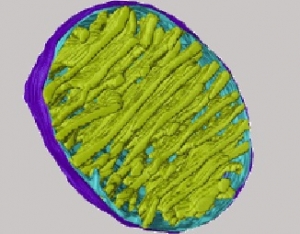 Here’s a 3D image of a mitochondria taken with electron tomography.
Here’s a 3D image of a mitochondria taken with electron tomography.
The whole focus is to introduce some beneficial movement if you can. Ideally, a mixture of aerobic and weight-bearing exercise is ideal. Meanwhile, building nutritional reserves with quality food is essential.
Keeping Cardio Cortisol Down
What if you simply want to keep your cortisol levels down during aerobic exercise? This would support lean muscle gains, right?
Maybe.
The research is indicating that the cardio can’t be too intense if you want to prevent drastic increases in cortisol.

Maybe more intense than this though …
Research indicates that cortisol levels can actually be decreased with aerobic exercise. For this to happen, the aerobic exercise intensity needs to be kept below 40% VO2. At 60% VO2, cortisol levels began to increase.
So it can be handy to know your VO2.
It is feasible that somewhere around 50% VO2 mark, cortisol levels will not considerably change.
If you are a bodybuilder, or someone on a quest to preserve muscle mass, sticking to around 40-50% VO2 for aerobic exercise is ideal. It is possible that using some cortisol lowering supplements, and perhaps increasing the aerobic exercise intensity to around 55-60% VO2 may keep cortisol levels from changing significantly.
This makes it hard for anyone wanting to burn calories. As lower intensity exercise uses less energy.
This ultimately means longer duration with a lower intensity could be a good thing. Only catch is, it takes more time …
However, don't fret too much. Contrary to popular belief, most weight loss is achieved through the diet, rather than increasing energy expenditure through exercise.
This is simply because it's really hard to burn off excess through training. Usually, it's easier to reduce your intake, or simply start with a carbohydrate restricted program to see if you are a "responder" to this type of diet, as most are due to insulin resistance.
What’s a Cortisol Blocker?
A cortisol blocker is any compound that attaches itself to a cortisol receptor without triggering any biological effect and blocks cortisol from binding. The receptor is called a glucocorticoid receptor, or NR3C1, which kind of sounds like a Star Wars android.
Because the cortisol blocker is occupying the receptor, cortisol (and other glucocorticoids) can’t attach. Although we still have the same amount of cortisol in the body, it has less of an effect on our body because less of the signal can get through to the cell.
It’s kind of like a game of musical chairs. There are only so many seats or receptors to go around. Once many of the seats are taken, people simply have to stand.
Cortisol blockers are primarily pharmaceutical. They work differently to cortisol lowering supplements, which reduce the total amount of cortisol synthesized in the first place.
Cortisol blockers reduce the end result of a stress response. While cortisol lowering supplements or lifestyle changes usually help to reduce the stress response in the first place, taking care of the cause of the issue.
How to Lower Cortisol Levels with Supplements
Nutritional and herbal supplements are a great way to change the way your body responds to stress. For anyone with confirmed low cortisol levels, it would be best to avoid the following supplements, except for Vitamin C and the herbal medicines.
This is simply because there is not enough published research on these nutrients. Therefore it’s hard to know how the body will respond in a low cortisol situation.
For everyone else, these are all great ways to keep cortisol down and keep a cool head. Less cortisol means less muscle breaks down, which supports the process of muscle growth.
Here’s an infographic showing how some basic nutritional supplements can impact cortisol levels.
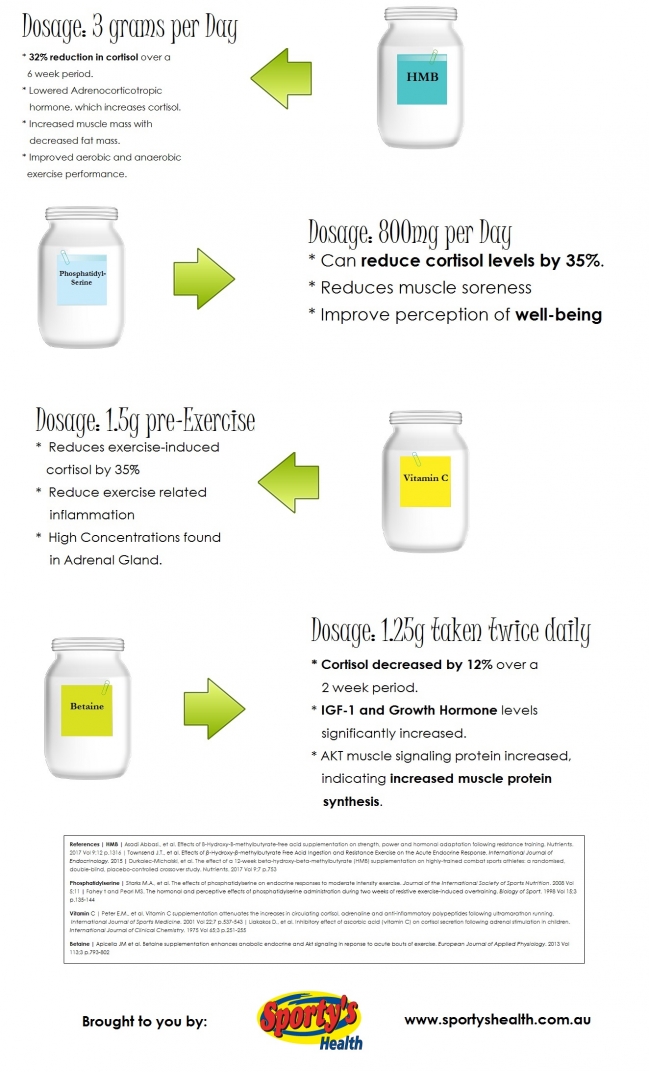
These are some pretty impressive results. And they are all natural compounds that offer other benefits as well.
If you’re looking for a Vitamin C product, you might like to try a liposomal version. It should be called something like “Liposomal Vitamin C”.
This type of Vitamin C absorbs very effectively, so you can take about half the daily dosage. Otherwise, use a regular Vitamin C and try the recommended dosage of 1.5g per day to lower exercise-induced cortisol levels.
If you want to take Vitamin C to support adrenal gland health and general cortisol balance, you might like to try a higher daily dosage. However, it’s important to remember that smaller and more frequent doses work better for this vitamin (unless you take a liposomal form).
For example, taking 1.5 grams, 3 times daily, will work much better than taking 4.5 grams all at once. This is because the more we take at the same time, the less we absorb.
The major precaution with vitamin C is if you have a history of kidney stones or suffer from haemochromatosis (high iron levels) 10. Most people simply experience loose bowels if they take too much of this vitamin.
If you are considering supplementing with Betaine (trimethylglycine), don’t get confused with Betaine HCL, as this is a bit different. Betaine HCL is mostly hydrochloric acid (HCL), which is a digestive aid. Go for betaine anhydrous or just betaine—which are actually the same thing: 100% pure betaine.
A word of caution with HMB. It tastes ghastly in powder form! I remember buying some around the year 2000 and most of it ended up in the bin. Capsules are best, or tablets as a second option. Ethyl ester and calcium bound forms both seem to deliver similar results.
Phosphatidylserine is a fantastic supplement. It also has impressive cognitive benefits, particularly for dementia. Unfortunately, it is very expensive and can be hard to find if you live in Australia. So you might want to try one of the alternatives.
Nutritional supplements aren’t the only products than support a healthy stress response and keep cortisol levels balanced. There are also a group of herbal medicines called adaptogenics.
Adaptogenic herbs help the body to resist stress. These herbs also help to balance a number of other bodily functions. Here’s a definition from the Merriam Webster Dictionary
Adaptogenic herbs support exercise performance and recovery. Many of these herbs have also been researched specifically for their cortisol-lowering effect.
Some of these herbal medicines are: Withania somnifera (Winter Cherry/ Indian Ginseng/Ashwagandha), Panax Ginseng, Rhodiola Rosea, Schisandra chinensis, Astragalus membranaceus and Siberian Ginseng 11,12,13.
Nutritional and herbal supplements can be a great natural advantage. They support our sports and exercise endeavours. And they help us respond better to stressful situations. Which leads to … guess what? Less Cortisol, which supports lean muscle mass maintenance and growth.
However, if you can use dietary and lifestyle interventions, as well as supplements, results tend to be much more dramatic. This is a much more holistic approach.
Restoring a Healthy Cortisol Level
If we all lived in a utopian society, without a trace of negativity or ill-will, our stress and cortisol levels would stay nicely balanced.
The fact is, more than 50% of people who go to see a doctor, for any reason at all, have a significant amount of stress with anxiety and depressive symptoms. Burnout and exhaustion are also common 14.
So what can we do apart from supplements and tweaking our exercise habits? We don’t have a utopia to live in. And unless you live off the land in the Himalayan Mountains, you get stressed anywhere between sometimes and most of the time, right?
So how about working towards an inner utopia?
Mindfulness meditation is a practice that is gaining a lot of scientific attention. It is one of the simplest forms of meditation. It costs nothing and can be done in the comfort of your home. You don’t need any particular skill set or history of meditation practice.
So far, research has indicated that mindfulness meditation offers benefits for the immune system, helps to diminish age-related brain changes and helps to reduce stress and cortisol levels 15,16,17.
A clinical trial of second year medical students indicated that a 4-day mindfulness meditation program led to a reduction in serum cortisol by a staggering 20%!
Even doing some simple deep breathing has been shown to improve mood and stress levels, heart rate and salivary cortisol 18.
Meditation is about using the power of the mind to create more favorable health conditions. This is the power of the placebo that is virtually studied in every drug, nutraceutical and herbal medicine clinical trial that is worth its salt. Meditation is about learning to harness the power of the placebo in a very direct way.

Research shows that people with a heavy alcohol intake have higher cortisol levels than those who drink moderately 19. Red wine is perhaps the best choice if you do drink. Pinot Noir has the highest resveratrol content. Resveratrol is a powerful antioxidant that supports mitochondrial function—the energy powerhouse of the cell.
In the past, a moderate alcohol intake has been linked to reduced cardiovascular disease risk. However, new research is suggesting that any alcohol intake at all may increase the risk of cancer. A moderate intake is 1-2 drinks, 4 days per week 20.
This was the first study to look at the difference between light drinkers and non-drinkers. Some of the lifestyle practices in the following infographic might help you unwind just as well as a glass of red.
Of course, we need enough sleep each night to keep us healthy. Not just quantity, but quality as well. Some basic tactics for achieving this are having no stimulants after lunch, like coffee, and making sure the room is pitch black.
Check out this infographic below. It shows you some interesting and creative ways to manage stress and keep your cortisol levels balanced.

Conclusion
Introducing ways to manage stress and cortisol have many benefits on physical, mental and emotional health.
Keeping cortisol levels down assists with the gain of lean muscle tissue. This is important for general health, particularly as we age. Bodybuilders and athletes of all ages can benefit from this.
If you think your cortisol levels may be low there is a lot that you can do. Meditation, controlled exercise, herbal medicines and much more, can be used to assist with recouping. If your cortisol level is low, it’s best to avoid phosphatidylserine, betaine and HMB until more research reveals how they reduce cortisol levels.
If you think your cortisol level is high, or you have a great deal of stress in your life and are constantly on-the-go, odds are you could do with some cortisol balance.
Many of the supplementation and lifestyle suggestions mentioned not only assist with balancing cortisol and stress, but also assist with general health in many other ways too.
For example, exercise boosts feel-good endorphin levels in the brain, while betaine supplementation can assist with the management of high homocysteine levels, which is a risk marker for cardiovascular disease.
The end result of exercising some of these recommendations is—and at great risk of a cliché—to live healthier and happier lives. I get it, this idea can seem unrealistic and borderline ridiculous at times.
But it’s not about expecting to float to work each morning on a cloud of joy. Maybe it’s simply experiencing less negativity and more positive emotions- more calm during what was once a stressful situation, and of course, less cortisol. This rubs off on others too.
References
- Obminski Z. Pre- and Post-start hormone levels in blood as an indicator of psycho-physiological load with junior judo competitors. Pol. J. Sport Tourism 2009 Vol 16
- Jackson S.E., et al. Hair cortisol and adiposity in a population-based sample of 2,527 men and women aged 54-87 years. Obesity. 2017 Vol 25;3
- Björntorp P. Hormonal control of regional fat distribution. Human Reproduction. 1997 Vol 12 (suppl 1) p.21‐25
- Hoyt L.T., et al. Positive upshots of cortisol in everyday life. Emotion. 2016 Vol 16;4 p.431-435
- Nicolson NA and van Diest R. Salivary cortisol patterns in vital exhaustion. Journal of Psychosomatic Research. 2000 Vol 49;5p.335-342
- Rosmond R and Björntorp P. Low cortisol production in chronic stress. The connection stress-somatic disease is a challenge for future research. 2000 Vol 97;38 p.4120-4124
- Fries E., et al. A new view on hypocorticolism. Psychoneuroendocrinology. 2005. Vol 30;10 p.1010-1016
- Admon R et al. Distinct Trajectories of Cortisol Response to Prolonged Acute Stress Are Linked to Affective Responses and Hippocampal Gray Matter Volume in Healthy Females. The Journal of Neuroscience. 2017 Vol 37;33 p.7994-8002
- Ruttle PL et al. Disentangling psychobiological mechanisms underlying internalizing and externalizing behaviors in youth: longitudinal and concurrent associations with cortisol. Hormones and Behavior. 2011 Vol 59;1 p.123-32
- Lykkesfeldt J. Vitamin C. Advances in Nutrition. 2014 Vol 5;1 p.16-18
- Auddy B et al. A standardized Withania somnifera extract significantly reduces stress-related parameters in chronically stressed humans: a double-blind, randomized, placebo-controlled study. Journal of the American Nutraceutical Association. 2008 Vol 11;1
- Choi JY et al. Red ginseng supplementation more effectively alleviates psychological than physical fatigue. Journal of Ginseng Research. 2011 Vol 35;3 p.331-338
- Olssen EM et al. A randomised, double-blind, placebo-controlled, parallel-group study of the standardised extract shr-5 of the roots of Rhodiola rosea in the treatment of subjects with stress-related fatigue. Planta Medica 2009 Vol 75;2 p.105-112
- Wiegner L et al. Prevalence of perceived stress and associations to symptoms of exhaustion, depression and anxiety in a working age population seeking primary care - an observational study. BMC Family Practice. 2015 Vol 16
- Black D.S. and Slavich G.W. Mindfulness meditation and the immune system: a systematic review of randomized controlled trials. Annals of the New York Academy of Sciences. 2016 Vol 1373;1 p.13-24
- Horst Laneri D et al. Effects of Long-Term Mindfulness Meditation on Brain’s White Matter Microstructure and its Aging. Frontiers in Aging Neuroscience. 2015 Vol 7 p.254
- Turakitwanakan W et al. Effects of mindfulness meditation on serum cortisol of medical students. Journal of the Medical Association of Thailand. 2013 Vol 96 Suppl 1 S90-5
- Perciavalle V et al. The role of deep breathing on stress. Neurological Sciences. 2017 Vol 38;3 p.451-458
- Badrick E et al. The relationship between alcohol consumption and cortisol secretion in an aging cohort. The Journal of Clinical Endocrinology and Metabolism. 2008 Vol 93:3 p.750-757
- Hartz S.M., et al. Daily Drinking is Associated with Increased Mortality. Alcoholism Clinical and Experimental Research. 2018



